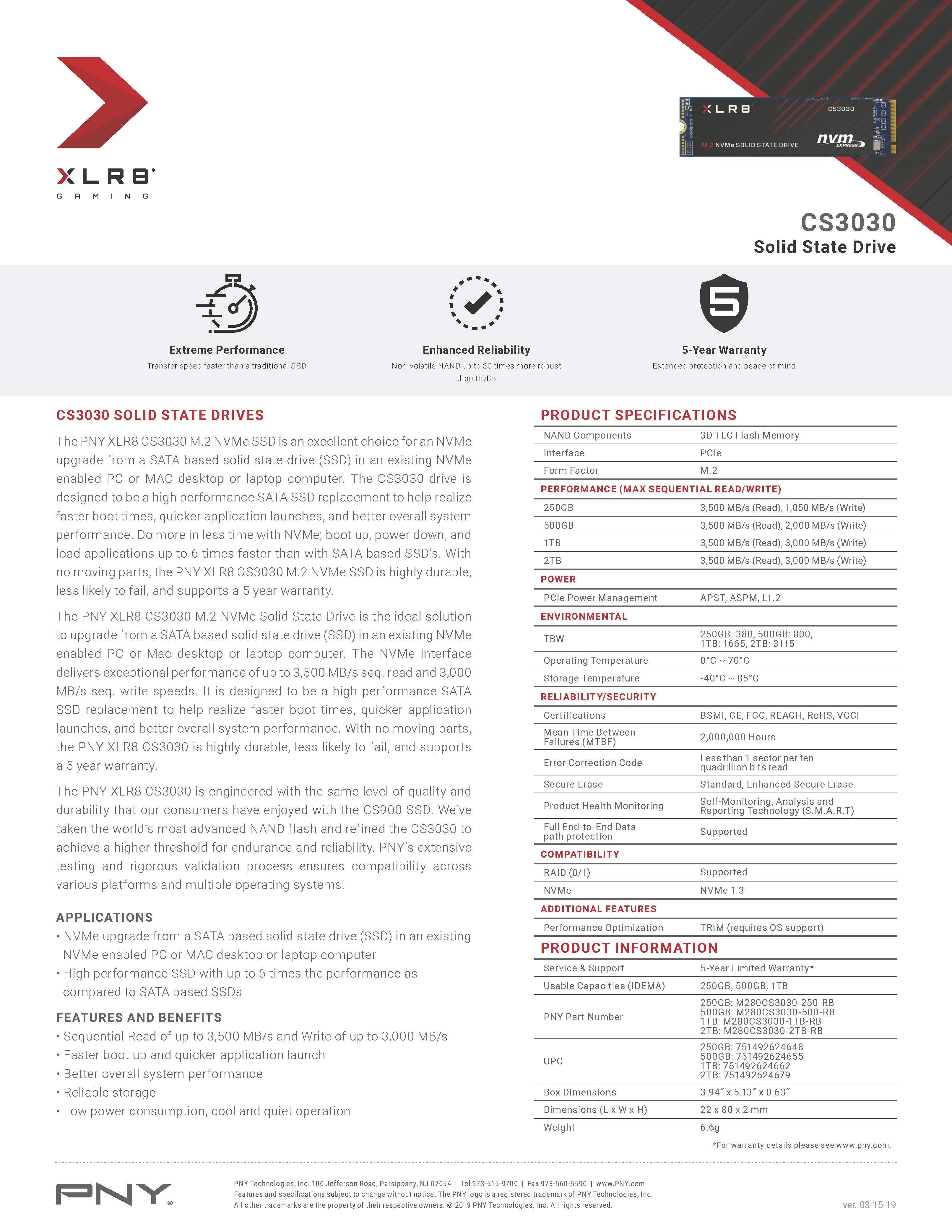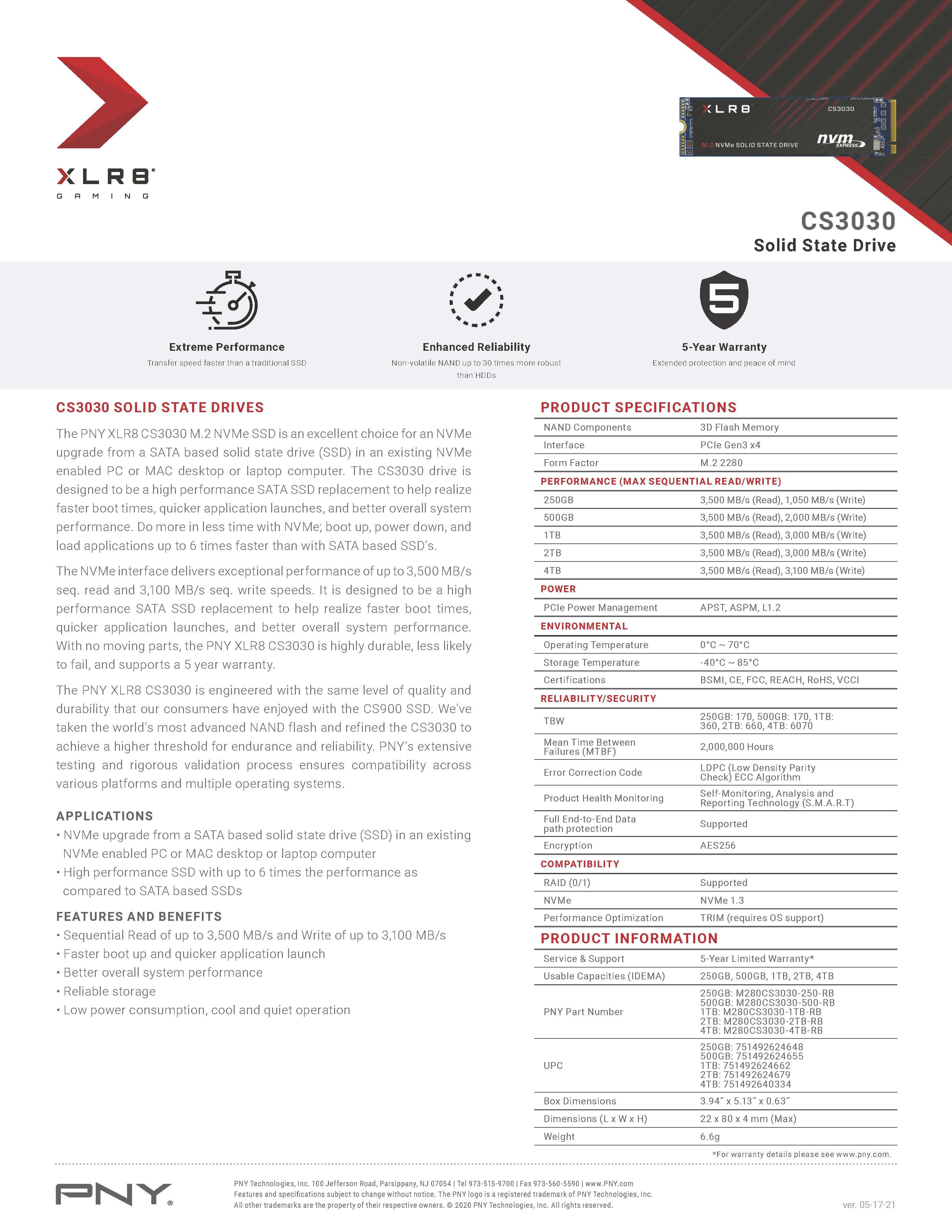PNY Quietly Reduces XLR8 CS3030 SSD's Endurance by Almost 80%
ComputerBase, a German news outlet, reported that PNY has significantly reduced the endurance rating for the brand's XLR8 CS3030 M.2 NVMe SSD. The recent change suggests that PNY might have secretly switched out some of the drive's core components for lesser quality parts.
The XLR8 CS3030 is a M.2 2280 SSD that runs on the conventional PCIe 3.0 x4 interface. The drive offers sequential read and write speeds up to 3,500 MBps and 3,100 MBps, respectively. Apparently, the performance between the new and previous revisions remains unchanged. While comparing the old datasheet with the new datasheet, we did notice that PNY no longer specifies the type of NAND that's used inside the XLR8 CS3030. For reference, the original XLR8 CS3030 used TLC (triple-level cell) chips. Although at this point in time, it's unknown if PNY replaced the NAND, the SSD controller or both.
It's not unusual for SSD manufacturers to swap out components. Big-name vendors, such as Kingston, Adata and Crucial, have all done so in the past. The problem arises when the maker doesn't communicate the changes to the consumer. Not every manufacturer produces their own components, so companies typically buy what's available on the market. Factors such as product cycles or shortages play a big role in whether vendors can secure the necessary components that were used in the original product.
PNY XLR8 CS3030 Specifications
| Capacity | TBW (Original Revision) | TBW (New Revision) | Difference | Part Number | Pricing |
|---|---|---|---|---|---|
| 4TB | N/A | 6,070 | N/A | M280CS3030-4TB-RB | $799.99 |
| 2TB | 3,115 | 660 | 78.8% | M280CS3030-2TB-RB | $329.99 |
| 1TB | 1,665 | 360 | 78.4% | M280CS3030-1TB-RB | $149.99 |
| 500GB | 800 | 170 | 78.8% | M280CS3030-500-RB | $64.99 |
| 250GB | 380 | 170 | 55.3% | M280CS3030-250-RB | $42.99 |
At least on paper, the XRL8 CS3030's performance seems unaffected. However, it'll require thorough testing to see whether the new revision performs equally as the previous revision. In PNY's case, the latter revisions of the XLR8 CS3030 arrive with a substantial reduction in endurance, which can be just as important as performance.
The 500GB, 1TB and 2TB variants of the XLR8 CS3030 all exhibit up to 78.8% lower TBW (terabytes written) ratings — just a few figures shy of 80%. Even the entry-level 250GB version suffers from a 55.3% reduction. Despite the lower lifespan, PNY still lists the XLR8 CS3030 with a limited five-year warranty, same as before.
SSD warranties work in two ways. The manufacturer backs the drive for a certain time period or a rated endurance, whichever comes first. While PNY maintained the five-year warranty, the XLR8 CS3030 SSDs have lower endurance rating. If you're the type of consumer that torture your SSDs, the drive will likely exceed its endurance value before the five years is up.


The biggest question that PNY has to answer is whether the company will honor the previous or new TBW ratings for drives that are on the market. More importantly, the brand will have to define how it will handle with the warranty on the XLR8 CS3030 for consumers who've already purchased the drive. The specification sheets show that both the original and new revisions carry the same part number so PNY isn't openly disclosing the change.
Get Tom's Hardware's best news and in-depth reviews, straight to your inbox.
For now, it's anyone's guess to why PNY modified the life expectancy of its XLR8 CS3030 SSDs. With the recent hype with farming Chia coin, PNY might just be frightened to have to deal with RMAs. Farming Chia on consumer drives is a bad idea since they'll probably perish in a matter of weeks, which is why Chia-designed SSDs like Sabrent's Plotripper exist.
ComputerBase reached out to PNY, and the company has admitted to the alteration. However, PNY refused to comment on what has change or the reason for the change. Nevertheless, we've reached out to PNY to see whether the brand will provide any further insights on the situation.

Zhiye Liu is a news editor, memory reviewer, and SSD tester at Tom’s Hardware. Although he loves everything that’s hardware, he has a soft spot for CPUs, GPUs, and RAM.
-
centauri0 I just purchased two of the 2TB ones two weeks ago for mining Chia. I wonder how you can tell the difference.Reply -
kal326 Those are looking like QLC level endurance ratings. I can’t see how they would stick with TLC chips, but drop endurance down to that level. Or swap to QLC chips, but not change the models.Reply -
jakjawagon I just bought one of these for my new laptop about two months ago. I also bought an Adata XPG SX8200 Pro for my dad's computer just before I found out they changed the parts in that. As far as I can tell I got the good version of the CS3030 (apparently write performance is significantly lower on the new ones), but I have no idea what version of the SX8200 I got.Reply -
watzupken That's why my advise is, just buy SSD from companies that produce their own NAND, and SSD controller if possible. So I will choose the likes for Crucial, Samsung, and to some extent Western Digital. All these brands like PNY, Adata, Kingston, which are infamous of switching out components don't have much control over the supply of components and will at some point change the specs/ parts. This to me is the third strike, so choose your SSD provider wisely if you get a chance to select it.Reply -
Mr5oh Replywatzupken said:That's why my advise is, just buy SSD from companies that produce their own NAND, and SSD controller if possible. So I will choose the likes for Crucial, Samsung, and to some extent Western Digital. All these brands like PNY, Adata, Kingston, which are infamous of switching out components don't have much control over the supply of components and will at some point change the specs/ parts. This to me is the third strike, so choose your SSD provider wisely if you get a chance to select it.
Worst part is those brands with a bad reputation for pulling this kind of stuff aren't that much cheaper. My data, time, and peace of mind is worth a couple dollars more. -
derekullo Before chia less than 1% of people would reach the endurance rating on consumer drives.Reply
It appears that PNY lied about the endurance number in order to boost sales figuring the majority would not come close to using it.
Sounds like a lawsuit ... -
GoboII Reply
This is looking pretty likely... On the spreadsheet for the original spec, it listed "3D TLC Flash Memory." On the new one, it just lists "3D Flash Memory." I'd also imagine that the switch to QLC is likely what gave PNY the storage density to release a 4TB model.kal326 said:Those are looking like QLC level endurance ratings. I can’t see how they would stick with TLC chips, but drop endurance down to that level. Or swap to QLC chips, but not change the models. -
waltc3 It's really hard to understand articles like this. 360/660TBW is enough "endurance" to last decades--certainly more than 20 years for the average user. These aren't server products, etc. 9999 people out of every 10,000 will replace these with newer products many, many years before the theoretical "wear-out time" of these drives...;) I'm still using a > 3-year-old 960 EVO 250GB NVMe drive with a 75TBW "endurance" estimate (when I bought it), and at present usage I've got at least 10-12 years life left in the drive. The PNY 250GB drive has an endurance estimate of > 2X that of the Samsung 960Evo 350GB NVMe drive--170TBW!Reply
Endurance estimates are almost always a waste of time--look at the warranties--that's the important metric. Say you've got a TBW of 4096, like the 4TB model, but you have a 5 year drive warranty. If you put on 8 TBW per year (which you'd have to work at doing)--well, gosh, the 4,096TBW endurance estimate means jack if you've put on 44TBW by year 6 and it fails--you can kiss that 4096TBW number goodbye--doesn't mean a thing! OOOOOooops--got to buy a new drive! TBW estimates are marketing hooks for n00bs, basically, imo. Notice how the warranties are of much, much shorter duration than the TBW estimates. -
Exploding PSU Should an everyday user like me be worried though? I've heard that SSD endurance really doesn't matter for regular users, but 170 TBW for the 500GB version sounds rather low. I mean who knowss what my future usage would beReply